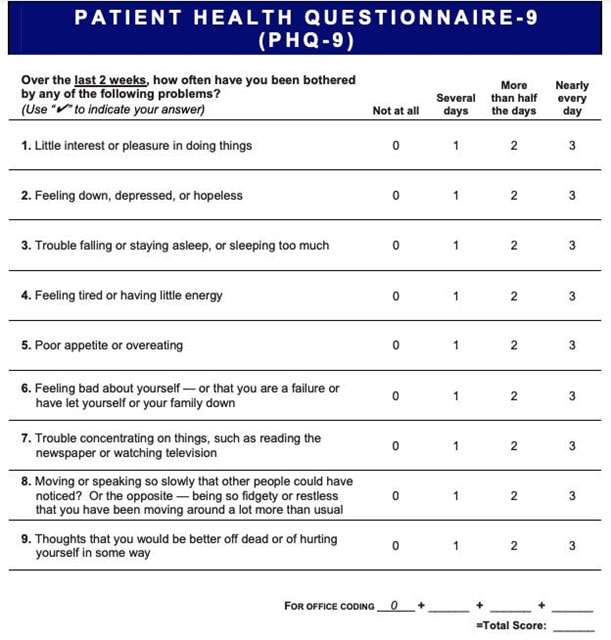“It wouldn’t have happened if it wasn’t for me,” said Howard Kroplick, a former marketer for Pfizer. What wouldn’t have happened without this big pharma ‘marketing man’?
The 9-item questionnaire, known as the PHQ-9-used to screen patients for depression by primary care doctors. It didn’t begin with a psychologist or psychiatrist; it started with a marketer.

The Beginning of the PHQ-9
Over two decades have passed since Kroplick convinced the company to invest in research to develop the PHQ-9. Pfizer had recently released the new antidepressant, Zoloft. This antidepressant would later become the 12th most commonly prescribed medication in the U.S.
The Idea-provide primary care doctors with a quick tool to help identify depression in patients
The Issue-primary care doctors were uncomfortable treating mental illness, patients were going untreated, and Pfizer was missing out on a vast potential market.
The Goal-make primary care doctors more comfortable prescribing antidepressants.
The Result-a simple, time-effective tool for doctors and an investment that paid off for Pfizer.
The tool was never meant to be the definitive diagnostic tool used to diagnose mental health issues in patients. It was initially meant to be a conversation starter between doctor and patient. It also wasn’t poorly designed. In fact, Pfizer hired licensed professionals to build the screening test. Now, the PHQ-9 is everywhere, cited in more than 11,000 scientific papers, and commonly given to patients during checkups and OB-GYN visits.
The 9-Item Depression Screening Test
Have you seen the example image of the PHQ-9 below? The questions touch on a range of potential issues: sleep disturbances, changes in appetite, trouble concentrating, and general enjoyment of life. If your primary care doctor suspects you might have depression, they’ll likely use one of these questionnaires.

PHQ-9: The Cog in a Failing System
STAT determined that this simple tool has now become a crutch used in place of mental health care rather than a gateway conversation between physician and patient. For physicians strapped for time, the PHQ-9 is a stand-in for a more in-depth clinical evaluation and a tool that makes it easy to over-prescribe antidepressants.
Data on whether the PHQ-9 has improved mental health outcomes is not clear. However, mental health outcomes are not improving, with the pandemic contributing to a worsening mental health crisis in the U.S.
- 9.2% of Americans 12 years of age or older experienced a major depressive episode in 2019
- Highest prevalence of depression found among adolescents (12-17 years) and young adults (18-25 years)
- 4% increase from 2020 to 2021 for suicide rates in the U.S.
While the PHQ-9 was created with good intentions, can depression be simplified to a 9-question, one-page questionnaire? To thoughtfully screen patients for depression requires more than a 10-to-15-minute exam. It requires clinical evaluation. The PHQ-9 does not suffice for a proper diagnosis if the patient is experiencing other commonly intertwined conditions like ADHD, addiction, eating disorders, alcoholism, and trauma, resulting in patients not being properly diagnosed or treated.
Depression is treated like a strep infection, with prescriptions churned out by primary care doctors with little to no training in mental health, says Tom Insel, the former head of the National Institute of Mental Health. He stated, “There’s more to treating depression than writing a prescription.”
Allen Frances, a professor emeritus of psychiatry and behavioral sciences at Duke University, stated, “The tendency is to not even look at the patient” during a typical visit. Instead, there are boxes to be checked, a stamp of diagnosis, and then send patients on their way. Physicians aren’t thinking about the cause of a patient’s depression, like job loss, money, or divorce.
“You’re thinking: ‘Aha, the test score says this person’s depressed, if I give them a pill, I’ll get them out of the office, they’ll be happy.” – Allen Frances
Antidepressants aren’t the answer for most patients. Yes, they work for some, yet other interventions aren’t discussed after the PHQ-9 screening. Interventions like psychotherapy, physical exercise, or mindfulness.
PHQ-9 Patient Example
Callie Williams was handed a PHQ-9 in 2016 when she visited her OB-GYN for a prenatal appointment. She marked the boxes and was told that she was depressed based on her score. Williams was newly married and a new stepparent. She reported being overwhelmed by altering life changes and no longer taking her ADHD medication during pregnancy.
She asked for a referral to see someone who could do a more thorough mental health assessment. In her interview, she says that her doctor refused and insisted she takes Zoloft or she would be marked non-compliant. Williams agreed to take the medication and reported it didn’t help. After her child was born, she saw a psychiatrist who listened and treated her for ADHD through medication and coaching.
“I’ve spent a lot of time grieving for how many years I’ve lost in being misdiagnosed.” – Callie Williams
Concluding Takeaways
The PHQ 9-item depression screening test was meant to help solve a real problem and fulfill an unmet need for more mental health treatment for patients during their routine doctor visits. It was never meant to be the definitive diagnostic tool. Yet we see where it has done a disservice to patients and has been a crutch for primary care physicians.
Far from a 9-item, single-page questionnaire is Axiom Medical’s workplace mental and behavioral health solution, Tempo Live. Tempo Live has routine, in-app health assessments to detect changes in an employee’s behavioral wellness to minimize the risk of a mental health crisis. It provides employees with proactive mental health first aid and 24/7 nationwide access to licensed medical professionals. We focus on the right treatment, right outcome, and right time.
Charli Pedersen is a published writer featured on Axiom Medical’s blog. She holds a bachelor’s degree in English, Professional and Technical Writing, and has experience creating content for businesses and non-profit organizations.










